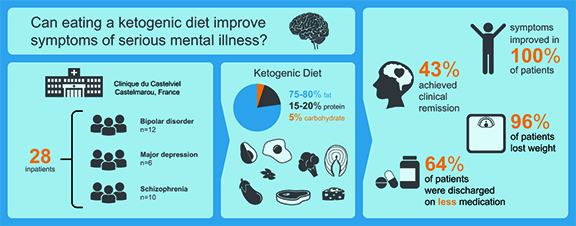Hi Mario,
I love Dr. Chris Palmer. I like reading his posts and watching him on social media.
He points out that the ketogenic diet is used to treat epilepsy resistant to medication. Well, about 1/3 of patients get great control, 1/3 improve, 1/3 the diet does not help.
He says that medication for seizure control is used in psychiatry to treat bipolar disorder. It is no stretch at all to then use the ketogenic diet, WHICH HAS BEEN EXTENSIVELY STUDIED to treat seizures, to then use for patients not responding to medication for serious mental health problems like bipolar disorder and schizophrenia (he says schizophrenia is the same disorder as bipolar on the same spectrum.
I don’t know if the ketogenic diet helps me. I did a strict protocol after buying books on it years ago-buying books that parents use to control seizures in their children.
My mental health was worse when I was heavier, period. Losing the weight made more difference than anything. I lost it in a higher protein version of low carb. I couldn’t lose much weight in that ketogenic diet and tend to eat too much higher fat food, unable to get satiety.
That said, I still love Dr. Palmer and would try it again if I ever get worse.
I’ve lost half my body weight-most of it came off in the past few years. I have not had an incident in the past year. My biggest problem is anxiety. Anxiety is probably at least 80% lower than most of my life. I haven’t had much in the way of intense anxiety for quite a long time.
I was in bad shape at several points in my life. All of them happened when I was over 250 pounds, and something happened to tip me over.
My career, my finances, my life has been negatively impacted. Anxiety and fear have kept me from what I should do.
I am the in the best shape I have been for at least the past 30 years.
I think the ketogenic diet should be tried. But if it doesn’t cause weight loss, if one is overweight, then something else should be tried, like adding fasting, maybe protein if satiety is an issue, because getting metabolically healthy is extremely important.
Dr. Palmer says that the brain is just one more organ in the body that takes a hit from metabolic derangement.
I dont follow Dr. Georgia Ede and Amber O’Hearn. I have nothing against carnivore and have many days where I don’t eat plant foods. I think they take away from the bigger answer which is to lose weight-their message I think can steer people away from weight loss lever. Ketosis is fabulous and I love it, but for the long haul weight loss I believe is going to bring healing, not just mitigation.
Amber o’Hearn in particular liked to show up and start criticizing higher protein side of low carb. I don’t get why she was showing up to start a protein argument. No one was talking to her; why show up and do that? We weren’t going into her feed and criticizing her posts. I mean, who cares? Why do that? This was a few years ago and annoying.

